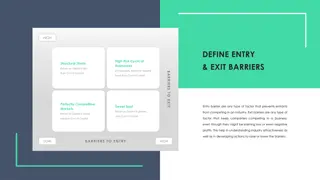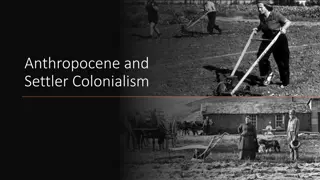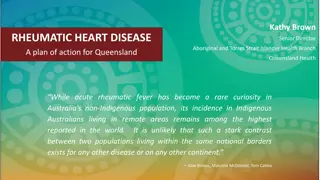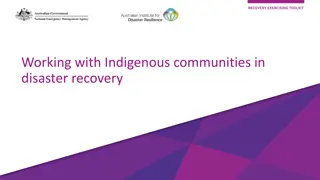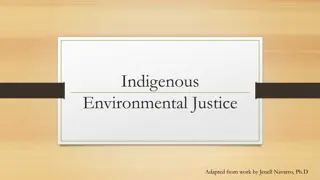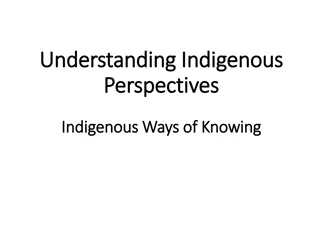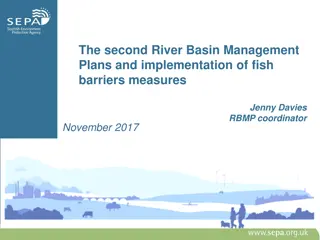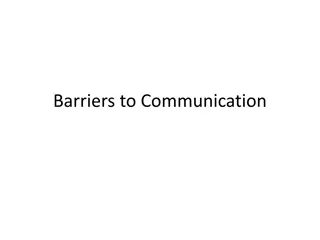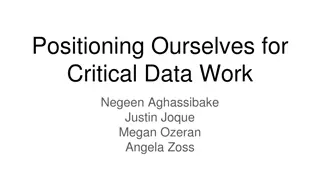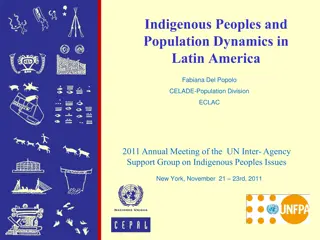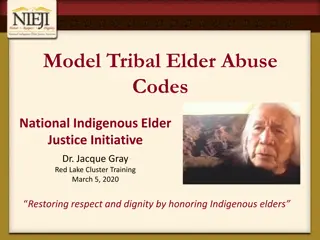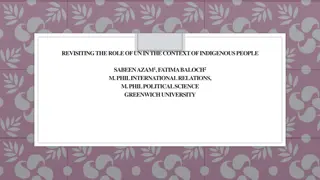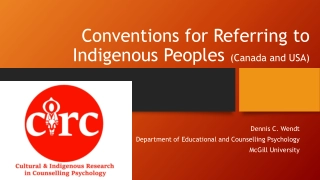Indigenous Studies Research Data Management Policy: Breaking Barriers in Indigenous Research
Covering cultural rights, Indigenous data custodianship, policy developments, and ATSILIRN protocols, this presentation at the National Indigenous Studies Conference in 2014 highlights key issues and approaches in managing research data in Indigenous studies.
Download Presentation

Please find below an Image/Link to download the presentation.
The content on the website is provided AS IS for your information and personal use only. It may not be sold, licensed, or shared on other websites without obtaining consent from the author. Download presentation by click this link. If you encounter any issues during the download, it is possible that the publisher has removed the file from their server.
E N D
Presentation Transcript
Indigenous Studies Research Data Management Policy Breaking Barriers in Indigenous Research and Thinking National Indigenous Studies Conference, Canberra, 2014
http://www.intersect.org.au Ingrid Mason em: ingrid.mason@intersect.org.au tw: @1n9r1d
http://www.ands.org.au Ingrid Mason em: ingrid.mason@ands.org.au tw: @andsdata
Covering today Cultural rights and ATSILIRN protocols Key issues: data custodianship Policy and process: research data management Data custodianship and policy and process development and GERAIS guidelines Key questions: policy and process development Research data management: policy example (Monash) Formalising processes: example (NLNZ) what/how Approaches to support indigenous studies
Leonard John Matthews CC-BY-NC-SA. Indigenous Flag Art. http://www.flickr.com/photos/67953162@N00/4227603729/
ATSILIRN Protocols The protocols address: the recognition of the moral rights of Aboriginal and Torres Strait Islander peoples as the owners of their knowledge; other important issues arising from Aboriginal and Torres Strait Islander content and perspectives in documentary materials, media and traditional cultural property;
ATSILIRN Protocols They are a guide to good practice which will need to be interpreted and applied in the context of each organisation's mission, collections and client community.
Key Issues Data Custodianship
Key Issue - Policy Developments in both the digital context and in the Indigenous information context indicate the need for a coordinated policy and planning approach to deal with the issues. (Aboriginal and Torres Strait Islander Library, Information and Resource Network (ATSILIRN) protocols (2002). Digitisation and Internet, p27.)
Key Issue - Metadata Become aware of the issues surrounding cultural documentation and the need for cultural awareness training. ... Share information on initiatives involving cultural documentation. (Aboriginal and Torres Strait Islander Library, Information and Resource Network (ATSILIRN) protocols (2002). Intellectual Property, Marcia Langton, p4)
Key Issue - Process The development of accessible guidelines and protocols for library and information services and Indigenous communities and organisations involved in documentation and the provision of access to Indigenous materials is also indicated. (Aboriginal and Torres Strait Islander Library, Information and Resource Network (ATSILIRN) protocols (2002). Digitisation and Internet, p27.)
Policy and Process Research Data Management
Research data management is.. Purpose: data created or collected, accessed and used to support research. Institutional role: manager, overseer and enabler of access.
Research data management policy.. Governance needed over actions of: data collection access and use, and, research conducted.
Policy >> Process Connections between legal requirements and organisational principles and practice. Application to the organisation, staff or affiliates, the data, and the research.
Research Data Management Policies University examples arising out of the ANDS funded Seeding the Commons projects.
Take away Formalise information about data custodianship and support of indigenous research: How decisions are made to collect or use data and support of indigenous research. What expert and relevant advice informs those decisions and how that advice is sought. What prior decisions have been made and why. What policies and processes (information and technical
Data Custodianship Policy and Process Development
http://www.flickr.com/photos/49503155381@N01/2476673198/ Philippa Willitts CC-BY-NC. Didgeridoos Close-Up
Data custodianship Roles and agency Responsibilities Institutional governance and practice Policy and process development Key questions
Roles and agency around data Data custodian Community Research institution Researcher Roles may be mixed, e.g. Data custodian is a member of the Community or Research institution is also Data custodian.
Responsibilities around data Data custodian access Community Advocate/protect Research institution Researcher Provide Support research Use data
Research institution practices Practices governed by laws, policy, procedures, standards and protocols. Practices may relate to: research conducted, data curated, and community advocacy or protection.
Key questions Policy and Process Development
Pre-existing policy? Research approval and conduct Community liaison or consultation Archives or records management Collection or information management
Pre-existing processes? Access to information (within institution). Reuse of information (from other parties). Research project approvals (within institution or by other parties).
Institutional context Where will research data management policy sit in the institutional policy framework? Where will research data management processes flow across the institution?
Ethics or cultural protocols? Are there social mechanisms, e.g. processes for consultation or community representation, to support decision-making? Are there practice-based mechanisms, e.g. evaluation criteria, established precedents, curatorial and research guidelines to support decision-making?
Who needs to be involved? What parties need to be engaged so that high level policy statements can be readily embedded in and inform institutional processes? Internal representatives, external partners, community members, independent observers or experts.
RDM Policy Example Monash University
Policy Example - Monash The purpose of this policy is to ensure that research data is stored, retained, made accessible for use and reuse, and/or disposed of, according to legal, statutory, ethical and funding bodies requirements. Research Data Management Policy
Policy Statement - Monash The management of research data should be compatible with the University s commitment to the highest ethical standards in research, protecting the rights, dignity, health, safety and privacy of the community, including research subjects, and with its commitment to the welfare of animals and the integrity of the environment.
Procedure Example - Monash Research Data Management: Staff, Adjuncts and Visitors Procedures Parent Policy: Research Data Management Policy Research data management awareness Faculties, heads of academic units and supervisors responsible for performance development must take all reasonable steps to ensure on a regular basis that all researchers are aware in advance of their obligations under this policy and procedures and the guidelines provided on the Monash University Research Data Management website;
Planning Example - Monash Guidelines for Ethical Research in Australian Indigenous Studies, AIATSIS, 2nd ed., 2011. >> Outlines principles and provides advice around applying those principles.
Applying principles Managing research: use, storage and access. Principle 13: Plans should be agreed for managing use of, and access to, research results. Identify at the start of a research project all Indigenous people, organisations and communities who will need to be involved in determining strategies for access to research results. Agree on the rights to research results, their forms and presentation, and individual or community use of them. This may involve ongoing access to data or representations of the results of research through digital media. (Guidelines for Ethical Research in Australian Indigenous Studies. AIATSIS, 2nd ed., 2011, pages 15-16.)
Formalising processes Steps further: maintain support documentation capture decision-making and curatorial methods build up institutional practice, information and knowledge advise the research community this is how we support indigenous studies and the process by which access to data is enabled Outcomes are: make the link between policy and practice explicit enable clearer understanding about how access to data can be supported and ethical research is conducted
Process Research Data Management
http://www.flickr.com/photos/rustystewart/4475514877/ Rusty Stewart CC-BY-NC-ND. Ampilatwatja Walk Off.
Process is the test Is data access and use consistent with intent in the policy, any ethics approval, or conditions of the data captured or already deposited?
Example: NLNZ Access Policy Access Principle #3 "Access to resources from the collections of the Alexander Turnbull Library may be subject to restrictions agreed with the donor, vendor or creator of the resources. Approval to make such restrictions will be delegated from the National Librarian." (National Library of New Zealand, Access Policy, Explanatory Guidelines Supporting the Access Principles, page 5, no. 3)
Getting into the detail: security Access Principle #6 Access to resources from the collections may be restricted by the need to preserve and protect the item. The National Library will maintain appropriate levels of security for collections and may require researchers and reference users to register. (National Library of New Zealand, Access Policy, Explanatory Guidelines Supporting the Access Principles, page 5, no. 6)
Getting into the detail: description Access Principle #19 To better address information needs of Maori, enhancement of records on National Library databases will be undertaken where the subject of the material is in te reo Maori or provides unique information about iwi. (National Library of New Zealand, Access Policy, Explanatory Guidelines Supporting the Access Principles, page 6, no. 19)
Getting into the detail: community Access Principle #18 The commitment made by the National Library to the Treaty of Waitangi has significant implications for the use of recorded knowledge relating to New Zealand's tangata whenua. The needs of research and reference users of Maori resources are recognised as a priority for the National Library. Protocols (See Appendix 1) for the treatment of, and access to Maori resources have been developed with advice from experts including the National Library's Komiti Maori. (National Library of New Zealand, Access Policy, Explanatory Guidelines Supporting the Access Principles, page 6, no. 18)
Principles to consider and formalise Guardianship Relationships Attribution Cultural development (National Library of New Zealand, Access Policy, Appendix 1 - Principles for the care and preservation of Maori materials, page 7-8.)
Relationships The National Library seeks collaborative relationships with families and descent groups connected to taonga in its collections. These relationships are drawn on to make decisions about all aspects of the management of these items, including conservation, exhibition and attribution regardless of whether the Library is legally the owner or guardian of the item in the collection. (National Library of New Zealand, Access Policy, Appendix 1 - Principles for the care and preservation of Maori materials, page 7-8.)
Cultural development Staff, particularly those with responsibilities for decision making in the areas of conservation and intellectual property, will have access to kaumatua and or Maori staff with the ability to promote effective relationships with iwi and hapu. (National Library of New Zealand, Access Policy, Appendix 1 - Principles for the care and preservation of Maori materials, page 7-8.)
A checklist: to manage your data Policy Storage Metadata Licencing Ethics Identifiers principles secure and robust discovery and access reuse consent stable
A checklist: data custodianship Content and perspective Intellectual property Secret or sacred material Offensive materials Governance and management Staffing Education and training Awareness of people and issues Copying and repatriation


